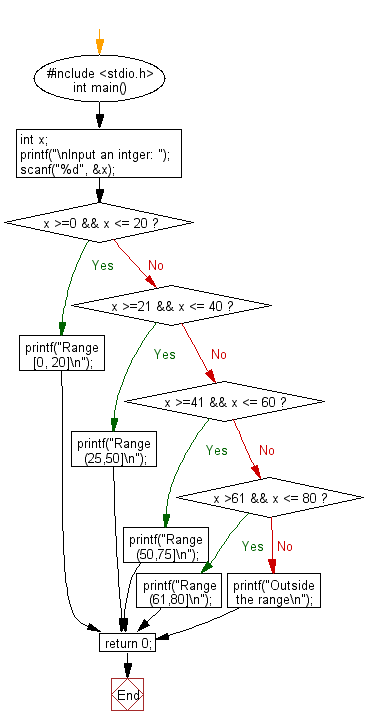C Exercises: Check the specified range where an integer belongs
C Basic Declarations and Expressions: Exercise-21 with Solution
Write a C program that reads an integer and check the specified range where it belongs. Print an error message if the number is negative and greater than 80.
Specified Range: [0, 20], [21, 40], [41, 60], [61, 80]
C Code:
#include <stdio.h>
int main() {
int x;
printf("\nInput an integer: ");
scanf("%d", &x);
if(x >=0 && x <= 20)
{
printf("Range [0, 20]\n");
}
else if(x >=21 && x <= 40)
{
printf("Range (25,50]\n");
}
else if(x >=41 && x <= 60)
{
printf("Range (50,75]\n");
}
else if(x >61 && x <= 80) {
printf("Range (61,80]\n");
}
else
{
printf("Outside the range\n");
}
return 0;
}
Sample Output:
Input an integer: 15 Range [0, 20]
Flowchart:

C Programming Code Editor:
Contribute your code and comments through Disqus.
Previous: Write a C program to print the roots of Bhaskara’s formula from the given three floating numbers. Display a message if it is not possible to find the roots.
Next: Write a C program that read 5 numbers and sum of all odd values between them.
What is the difficulty level of this exercise?
Test your Programming skills with w3resource's quiz.
C Programming: Tips of the Day
Static variable inside of a function in C
The scope of variable is where the variable name can be seen. Here, x is visible only inside function foo().
The lifetime of a variable is the period over which it exists. If x were defined without the keyword static, the lifetime would be from the entry into foo() to the return from foo(); so it would be re-initialized to 5 on every call.
The keyword static acts to extend the lifetime of a variable to the lifetime of the programme; e.g. initialization occurs once and once only and then the variable retains its value - whatever it has come to be - over all future calls to foo().
Ref : https://bit.ly/3fOq7XP
- New Content published on w3resource:
- HTML-CSS Practical: Exercises, Practice, Solution
- Java Regular Expression: Exercises, Practice, Solution
- Scala Programming Exercises, Practice, Solution
- Python Itertools exercises
- Python Numpy exercises
- Python GeoPy Package exercises
- Python Pandas exercises
- Python nltk exercises
- Python BeautifulSoup exercises
- Form Template
- Composer - PHP Package Manager
- PHPUnit - PHP Testing
- Laravel - PHP Framework
- Angular - JavaScript Framework
- Vue - JavaScript Framework
- Jest - JavaScript Testing Framework
